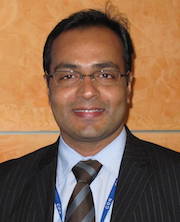 Mizanur Rahman
Mizanur Rahman
Associate Professor
Department of Accounting & Information Systems (AIS)
University of Dhaka
Public Policy Program (’03); Ph.D. Program (’08)
Dr. Mizanur Rahman is an associate professor in the Department of Accounting & Information Systems (AIS) of the University of Dhaka. He got his undergraduate and graduate degrees in accounting from the same university.
His professional engagements have included international consultancies with the Asian Development Bank (ADB), ADB Institute, World Bank and UN organizations. Mizanur received many competitive research grants from these organizations. He has been a visiting professor to Sophia University, East West University, Southeast University and Jagannath University in Bangladesh. Dr. Rahman has widely published in international journals. He often appears in electronic media and writes op-eds in print media on issues of public policy relevance.
In January 2010, the Global Development Network (GDN) awarded Dr. Rahman the Luxembourg Ministry of Finance First Prize for his outstanding research on development under the theme of “Regional Integration–Convergence Big Time, or, an Opportunity Wasted.”
He is currently the research director of “Accounting for Capital Market Development in Bangladesh,” a research project jointly administered by the World Bank and the University Grants Commission (UGC) of Bangladesh. Dr. Rahman is also a member of a project team of the World Bank reviewing macroeconomic and monetary management in Bangladesh.
Dr. Rahman received his Masters and PhD degree in Public Policy, in 2003 and 2008 respectively. He is a focal point for the deepening of academic and research collaboration between Bangladesh and Japan.
What is your area of specialization and how did you come to work in this area?
I have specializations in areas of accounting and economics. I obtained undergraduate and graduate degrees in accounting from the University of Dhaka in 1997 and 1999 respectively. I then joined the University as a lecturer of accounting in September 1999. A norm is that university lecturers after they join the university will pursue higher education and research abroad in areas of their respective disciplines and then return back with enhanced human capital to work in their home universities. An exception however occurred in my case. It is that I got an opportunity to pursue Masters and then PhD degrees in public policy at the National Graduate Institute for Policy Studies (GRIPS). De facto, I got both the degrees heavily tailored in economics. GRIPS is unique in terms of flexibility in
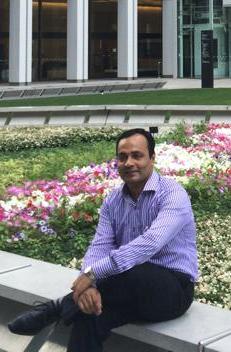
Mizanur Rahman on August 2, 2014, in front of Kasumigaseki Building, Tokyo.
the design of its academic programs. Initially, I was unsure of its potential effects. But the end result is that the degree programs played a transformational role in my ability to define and then carry out policy studies. I remember late Professor Fumio Nishino with deep gratitude for his support and motivation to study public policy at GRIPS. I know Professor Fumio Nishino made a hard bargain with ADB in 2003/04 fiscal year for two PhD scholarships—one for me and the other for Liu Junming, one of my Chinese friends. Nishino Sensei however died in May 2007 and could not see us graduate successfully. May God Bless His Departed Soul.
Have you always wanted to pursue a career in academia? What attracts you most about it?
No, I planned to be a chartered accountant. I changed my career goal after I found that my academic standing would allow me to join the University as a teacher. This particular job in Bangladesh carries a substantial social value and that attracted me most. In addition, the job then offered me tremendous growth opportunity without curving freedom in my thinking and behavior.
In your current capacity, what do you see as the main opportunities and challenges for Bangladesh over the course of the next five to ten years and how do you think you can contribute to the development of your country?
Bangladesh is a fast developing country. The country is poised to become a middle-income country by 2021. A majority of its population is young and the need for sustained human capital development is enormous. The country is also suffering from huge governance challenges. I therefore see twin opportunities. One is that I will carry out economics research to influence public policies. The other is that I plan to evolve into an institutional framework to improve governance in export production and in the private sector in general. The latter goal I will pursue mainly via programs and projects for human capital development in Bangladesh. We are working hard for developing an organization to this end.
What are some of the biggest challenges you face in your work?
The biggest challenge is that the incentive mechanism of the University is ill-defined. It is hardly rewarding for serious academic research. I am therefore broadening my professional outreach at home and abroad and defining a number of effective collaborations to promote and support my research activities.
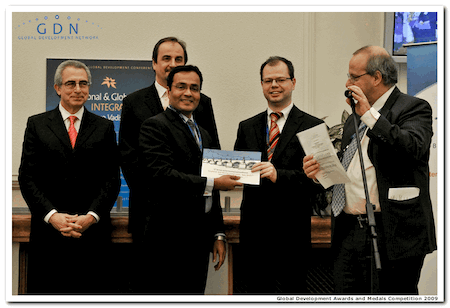
Mizanur Rahman receiving Global Development Network (GDN) Medal for Research on Development-2009 in the Annual GDN Conference held during January 15-17, 2010, in Prague, Czech Republic.
In 2009, I participated in GDN’s Global Development Awards and Medals Competition and won the first prize for my research on “Regional Integration – Convergence Big Time, or, an Opportunity Wasted”. As a part of the 11th Annual Conference of the Global Development Network (GDN), the prize distribution ceremony was held on January 17, 2010 at the historic Czernin Palace in Prague, Czech Republic. Dr. Ernesto Zedillo, Chairman of the GDN Board of Directors and former President of Mexico, chaired the Prize Distribution Ceremony. The ceremony was attended by more than 500 researchers and policy makers from around the world. The then GDN President Dr. Gerardo della Paolera presented me the award, worth US$10,000, pointing out that my research won the competition featured by more than 480 scholarly submissions. That was the most rewarding point in my academic career. (Just a passing note, I lost that money by investing in stock markets. However, the recognition has continued to drive me for serious research.)
That particular research was about resolving global payment imbalance between the United States and China. In fact, the build-up of an unsustainable payment imbalance in the US was substantially mirrored in the reserve accumulation by East Asian countries including China notably. The US Senate and many hawkish policy makers then attributed the unsustainable current account deficit in the US to an undervalued Chinese Renminbi (RMB). An alternative but minority view was that the US current account imbalance was indeed unsustainable but its
resolution would not come via a unilateral RMB appreciation and/or a trade embargo on Chinese exports to the US. It would rather require a collective appreciation of East Asian currencies against the US dollar. The findings of the paper validated this latter proposition just before the global financial crisis began in 2008. The study then predicted that unless “coordination and shared responsibility” led to a gradual adjustment of it, the world would move towards a major financial crisis. Unfortunately, the world economy suffered a crisis which is unprecedented since the Great
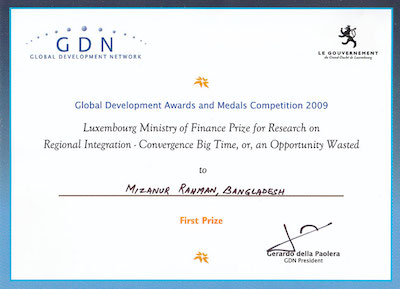
Citation of the GDN Medal for Research on Development–2009
Depression in the 1930s. But we still observe no credible framework of international macroeconomic coordination.
Should you be interested in this paper, please click here
The Impact of Real Exchange Rate Flexibility on East Asian Exports
THE WORLD ECONOMY
Volume 32, Issue 7, July 2009, Pages: 1075–1090
I have some further achievements to share with you. The World Bank provided me a three-year funding in 2012 to carry out capital market research in Bangladesh. That happened in the aftermath of stock market crisis in December 2010. In fact, the crisis is an outcome of serious governance problems in the Bangladesh financial sector. In this project, we have conducted research in areas of corporate governance, financial reporting & transparency, and value relevance of accounting information in Bangladesh stock exchanges. In the process, we have produced a long-series of outputs and made more than thirty research communications to a wide range of stakeholders. They represented regulators, corporate executives, capital market journalists, researchers and a large number of graduate students. I have written more than 50 op-ed articles in the Daily Star, the Financial Express and other Bangla dailies in the country. I do regularly appear in the talk show on economy and capital market hosted by major TV channels.
Our research work and its communications through print & electronic media and academic journals have led to a number of new acts and securities regulations. Bangladesh Securities and Exchange Commission (BSEC) in November 2012 issued a regulation on ownership structure of the listed companies. We proved to be the first to discredit the regulation and the Bangladesh Supreme Court later gave a verdict confirming our stance on the ruling. We have also created huge demand for and helped bring in many institutional reforms in the country. Demutualization of Dhaka and Chittagong stock exchanges is one prominent among them. These reforms have certainly enhanced enforceability of rules and regulations and the governance of stock markets in Bangladesh.
We are pleased to share with you that in July 2014 the World Bank approved us a second funding scheme for another three-year to do research on Bangladesh macroeconomic and monetary management.
You spent more than 5 years in Japan and obtained both your Masters and Ph.D. from GRIPS. What led you to GRIPS and how has your time and studies in Japan influenced you in your subsequent life and career?
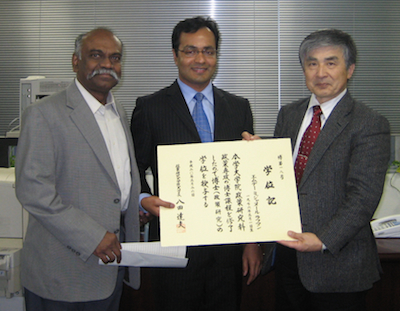
Mizanur Rahman receiving the Doctor of Philosophy (Ph.D.) in Public Policy from the then Dean, Professor Tatsuo Oyama and his academic supervisor, Professor Kaliappa Kalirajan.
I spent about 7 years in Japan if you include my stint with the Asian Development Bank Institute (ADBI). I had never planned to come to GRIPS. It was luck which I think led me to GRIPS. But the chance then transformed me into something that I very much contemplated. An opportunity to pursue both the Masters and PhD degrees has indeed enabled me with many transferable skills that I still carry on at par with global peers. I will do disservice if I forget to mention that my attachment with FASID graduate program at GRIPS and the faculty members who were then running the program proved very much determining in shaping my economics knowledge. Professor Kaliappa P. Kalirajan who is now a professor of economics at Crawford School of Public Policy of the Australian National University played a distinct role in the process. I do also gratefully remember Professor Keijiro Otsuka and Professor Tetsushi Sonobe for their inspiration and supports. I pay my sincere homage to late Professor Yujiro Hayami. He was a great economist and influenced many students including me. It is sad that the FASID program later discontinued.
My time and studies at GRIPS has had a lasting effect on my later career. While doing a PhD in public policy, I had a rare opportunity to work with Dr. Masaru Yoshitomi, the then CEO and President of the Research Institute for Economy, Trade and Industry (RIETI). There I also worked with Dr. Willem Thorbecke on “Global Payment Imbalance” Project. It was a time when I came to know many Japanese academics and researchers who are prominent in economics research. That network further deepened when I later moved to Asian Development Bank Institute (ADBI) in 2008 and carried out research on trade and exchange rates in East Asia. I was then working under the supervision of Dr. Masahiro Kawai, the then ADBI Dean.
What is your fondest memory of your time spent at GRIPS?
I have many fond memories. One of them is when we first arrived in Tokyo International Exchange Center (TIEC) by a Limousine bus, I think, straight from Narita. The modern facilities of TIEC and the scenic beauty of Odaiba proved extra-ordinary. I really loved it. Though I had visited some Asian cities, Odaiba was unique. There happened to be a marriage between diversity and harmony. I was living in Building-B, for some three years. I cannot forget a Filipino gentleman who used to come twice a week to sell vegetables and other groceries from a truck. It was a point when we residents from around the world met and interacted. I learned a lot in GRIPS to become a complete man. In the early years, GRIPS used to be in a small building opposite to Tokyo Women’s Medical College Hospital (Tokyo Joshi Idai). It was wonderful to travel about an hour everyday in the subway and Yurikamome line.
What do you miss about Japan?
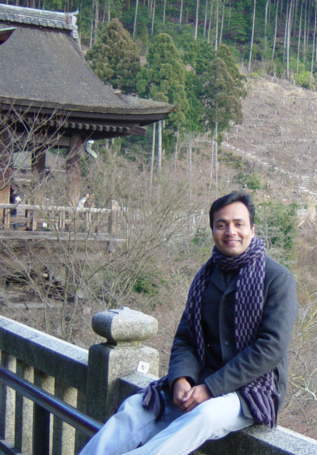
Visiting Kyoto in 2003.
I miss my life and living in Japan. Japan is a wonderful country in every measure. People are highly disciplined. They are receptive, kind and cooperative. One thing always impressed me that individuals are buried in their group identity. In South Asian context, it is greatly missing. I believe people must sacrifice some independence to develop team spirit. A culture of efficiency prevails in every walk of life in Japan.
What is your favourite thing to do when you are not working?
I do community work in my free time. I love politics and, I strongly believe, one cannot influence his/her society if he/she proves antagonistic to politics. I have two kids-one is four years old and the other is two-and-half years old. I really enjoy my little available time with them. They are exceedingly lovely. Please pray for them. I am trying to find some more time for my wife too. She hardly complains about my workaholic type though. I am lucky indeed.
How do you maintain a balance between your work and the rest of your life?
That is a difficult question for me. I think I am somewhat failing on this criteria. I will seek advice from my wife and friends to improve on this. Please write me your strategy on this matter.
What advice would you give to current GRIPS students?
It is not good advising others. I will suggest my friends who are now studying at GRIPS that you can bring about significant change in you if you utilize your time efficiently at GRIPS. GRIPS is a global knowledge hub. GRIPS programs are highly flexible. You can tailor your own program and earn a degree of global standard. Many GRIPS professors are celebrated researchers in their areas of expertise. Do not hesitate to approach them for your academic and research questions. The GRIPS library is extra-ordinary. Never leave GRIPS without exploring it. Living in Tokyo is great. Please find your time to see around Tokyo and Japan.
Do you have any suggestions on how to further utilize the GRIPS alumni network?
GRIPS alumni network is a great resource. Our Alumni Director, Karin, must be credited for her perseverance and untiring efforts to bring it to this level. I view that GRIPS is very uncommon in the sense that its alumni are mainly civil servants in many countries around the world. Many of them are – or on the way to becoming -leading policy makers for their governments. GRIPS can convene an annual conference so that their alumni can showcase public policy cases and learn from latest public policy research.
One passing remark: Life is too short. It is just spoiled if one makes no difference in this world.





